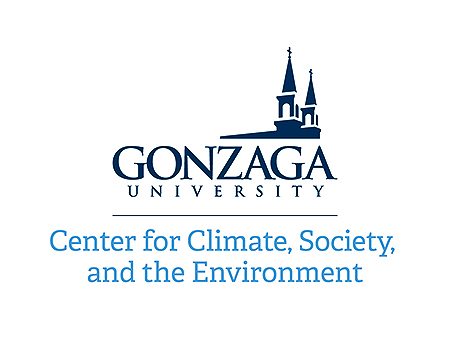Gonzaga Launches Center for Climate, Society and the Environment
Thursday, April 22, 2021

SPOKANE, Wash. — Gonzaga University is celebrating the 51st Annual Earth Day on April 22 by launching the new Gonzaga Center for Climate, Society and the Environment and an event featuring some of the nation’s top thought-leaders on climate change and solutions.
Washington Gov. Jay Inslee; Bill McKibben, founder of the international climate action movement 350.org; and Keya Chatterjee, executive director of the U.S. Climate Action Network will participate in a panel discussion that’s free and open to all. The live-streamed discussion begins at 3:30 p.m. Registration is required at bit.ly/GonzagaClimate.
An expression of Gonzaga’s Catholic, Jesuit and humanistic tradition, the Climate Center will provide resources and opportunities to meet the unprecedented challenges facing humanity and the wider natural environment in the 21st century. This new interdisciplinary academic center will serve Gonzaga students and our region by advancing innovative, interdisciplinary scholarship, teaching, consulting, and capacity-building.
Brian G. Henning, Ph.D., chair and professor of environmental studies and professor of philosophy at Gonzaga, will serve as the founding director of the new center.
Professor Brian G. Henning, Ph.D., will serve as the founding director of the Center. (GU photo)
“At this pivotal moment in history all fields of human inquiry are called upon to collaborate in what the eminent late cultural historian Father Thomas Berry, CP, Ph.D., of Fordham University called the ‘Great Work’ of our era: to transition from a period of devastation of the Earth to a period of integral Earth-human relations,” Professor Henning noted.
Gov. Inslee thanked Gonzaga for its leadership in creating the Center.
“The Gonzaga Bulldogs are the right mascot. We’ve got to be bulldogs on this issue (of climate change). We’ve got to grab our teeth into it and not let go until we beat this monster. So, this is a bulldog kind of effort and I want to thank Gonzaga for its leadership.”
Gonzaga President Thayne McCulloh, D.Phil., said the University is committed to the objectives of the Center.
“Our attention to the issue of global climate change is nourished by our faith and the leadership of the Roman Catholic Church, which calls us all — individuals and institutions alike — to act urgently not only to reduce our impact by changing our habits, but also to change our hearts to care for our common home,” President McCulloh said. “The Center for Climate, Society, and the Environment is a concrete manifestation of Gonzaga’s ongoing commitment to leading and learning as we seek together to create a more just, equitable, and integral world for all.”
The Center reflects Gonzaga’s regional leadership in:
- Educating students to live and lead in an era of climate disruption
- Preparing faculty (both university faculty and K-12 educators) to thoughtfully incorporate sustainability pedagogy and curricula, and
- Assisting municipal, tribal, and corporate entities to understand and respond to the challenges of climate change.
“Gonzaga has long been committed to giving life to its mission to graduate students who see and seek to resolve the ecological and social challenges facing our world,” Professor Henning said. “The growing threat of climate change requires that we do much more in order to prepare our students and our community for the very difficult future that we are creating. Through the Climate Center, Gonzaga can play an important role in helping our region understand and respond to the challenge of anthropogenic climate change.”
Professor Henning cited the major areas of emphasis for the Center in relation to the climate crisis:
URGENCY: The human species now threatens Earth’s capacity to sustain life as we know it. Global climate change is an urgent and significant threat that will define much of the 21st century.
NEED FOR A RENEWED COMMITMENT: As a Jesuit, Catholic, humanistic institution of higher learning, the Gonzaga Climate Center is a central expression of our mission to foster — as directed by Gonzaga’s Mission Statement — “global engagement, solidarity with the poor and vulnerable, and care for the planet.”
CLIMATE LITERACY: As an academic center the Climate Center focuses on education both within the University and externally to foster greater understanding and to help form people prepared to face the challenge, specifically:
Internal to Gonzaga University
- Provide innovative education courses, educational experiences, and research opportunities for GU students so they are prepared as leaders for a just and sustainable world.
- Facilitate interdisciplinary work by a community of engaged faculty prepared to thoughtfully incorporate climate pedagogy and curricula.
- Enable new opportunities for students and faculty to collaborate, learn, and research together.
- Encourage faculty research on local, regional, national and international environmental issues.
In Partnership with the Community
- Provide training and workshops to prepare K-12 public and Catholic parochial schoolteachers and others to thoughtfully incorporate climate literacy into their classrooms.
- Prepare Gonzaga undergraduates to teach activity-based climate lessons in K-6 classrooms.
- Develop regionally focused climate lessons as open educational resources.
CLIMATE RESILIENCE: The Climate Center is a regional resource, offering expertise, information, and assistance to help municipal, tribal and corporate entities to understand and respond to the challenges of climate change. Specifically, the Center will:
- Offer Inland Northwest business leaders, policymakers and others invaluable research, expertise, and advice as to make plans to help their organizations and communities understand, mitigate, and adapt to climate change.
- Present a series of lectures and colloquia related to climate, society and the environment open to all, fostering greater awareness and understanding.
- Prepare to work with communities on climate-related issues, such as greenhouse gas inventories and modeling costs of implementing (or not implementing) climate-related initiatives.
DISTINCTIVE: The Center is distinguished by its singular focus on climate change, and its interdisciplinary approach to the challenge. It is the only center at a Jesuit institution to focus on the challenge of climate change and how it relates to society and the environment. The Center will leverage its distinctive approach to:
- Bring together scholars in the arts, business, education, engineering, humanities, law and the natural and social sciences to focus on climate, society and the environment.
- The initiative is the only center at a Jesuit institution to focus on the challenge of climate change and how it relates to society and the environment
- Build on the following existing programs and efforts to support, coordinate and amplify their impact:
- The Cataldo Project
- The Environmental Studies Department
- Science in Action Program
- The Francis Youth Institute
- School of Business Administration’s Sustainable Business Minor
- School of Engineering & Applied Science
- Gonzaga’s own Climate Action Plan and goals
Learn more about the Climate Center or register to attend the virtual launch event at bit.ly/GonzagaClimate.

